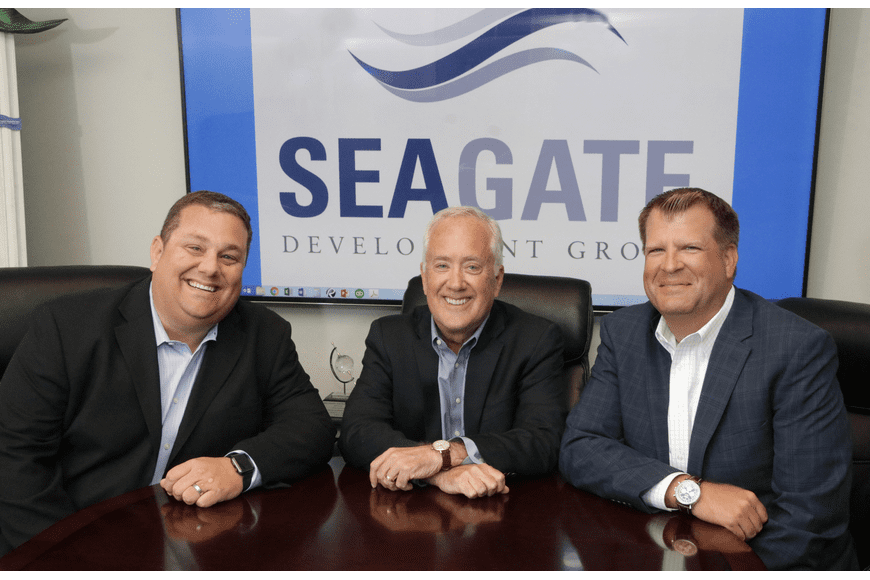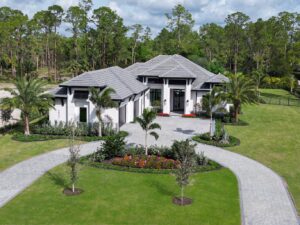Three-year-old development firm cites client-forward range of services behind rapid growth. Next challenge: Manage the rush of business.
The three founders of Seagate Development Group in Fort Myers launched the business in 2015 with a strategy that allowed the company to hit nearly $50 million in annual sales by year three.
The key to the strategy? A customer-centric philosophy that profit will follow service.
William Price, his son Matthew Price and James Nulf left another company to form Seagate, a full-service firm that offers design, development, construction, brokerage, leasing and financing services for residential and commercial properties. Armed only with diverse areas of expertise, relationships to leverage and a staff of 14, the three have overseen a business that’s grown from $17.6 million in revenue in 2015 to $48.8 million last year —up 177%.
The company now has 35 employees and executives anticipate hiring five more by the end of the year, quickly outgrowing the 4,500 square feet of office space in Westlinks Business Park, which the company owns, in the Gateway area. Seagate’s new 13,500-square-foot corporate headquarters, off Alico Road next to Interstate 75, is scheduled to open next summer.
In addition to the partners’ familiarity in the market, they credit their early success to prioritizing service over profit.
“I think what makes us different is our dedication to our customers,” says Nulf. “Creating the customer experience and the best products are the focus, and profit will come if you do everything right. That is our core business philosophy.”
To that point, William Price adds, “The mistake that I think many companies make is chasing the profit instead of chasing the customer service. We wanted to start with the philosophy of treating customers and partners better than they expect, and the profit will follow.”
Among Seagate’s first acquisitions was a controlling interest in the 174,872-square-foot Eastlinks Business Park in Gateway. It partnered with Naples-based Barron Collier Cos. in the $14 million investment. Barron Collier Chief Operating Officer Brian Goguen says the partners recently sold the office buildings for $25 million — an $11 million return on investment in three years.
Seagate remains the leasing agent for the Eastlinks. It still owns the 340,335-square-foot Westlinks.
“They were able to lease up the vacant space and negotiate some good leases at higher rents to greatly increase the value of the property,” says Goguen of the Eastlinks success.
Property management — it handles 1.5 million square feet of commercial and industrial space in Southwest Florida — and leasing expertise is only one area of Seagate’s diverse portfolio of services. Its residential projects include building homes in Hill Tide Estates on the southern tip of Boca Grande, in Windward Isle and Quail West in Naples and Miramar Lakes in Estero. And the company also designs and builds commercial space for long-term hold, for sale and by contract, often with the participation of investment partners such as Barron Collier.
“One of the things we have that other residential and commercial development companies may not have is the management and the brokerage side,” says Matthew Price. “We’re kind of one-stop shop, whereas others may concentrate just on construction or development, or just do specific aspects of projects. We can take it from A to Z, and that is what I think differentiates us in the market because most developers don’t have all those aspects in-house.”
Snowball effect
Nulf and the Prices left their prior firm to form Seagate because they saw it as a greater opportunity to implement their own approach to the industry.
“We wanted to take the company in a different direction and incorporate some of our ideas, and we figured the best way to do that was to do it ourselves rather than stay where we were,” says William Price.
The elder Price says the company’s quick success doesn’t surprise him, although its rapid acceptance in the market does. They leveraged their relationships built over 20 years in Southwest Florida to balance the risk of taking the plunge on their own venture. Even with no revenue-generating development projects contributing to the bottom line, they rolled the dice and started with more than a dozen employees.
“The mistake that I think many companies make is chasing the profit instead of chasing the customer service. We wanted to start with the philosophy of treating customers and partners better than they expect, and the profit will follow.” Seagate Development Group co-founder and CEO William Price
“We invested in the beginning, even when work wasn’t coming for six months,” says Nulf. “We were dedicated to building the team from day one.”
Barron Collier Cos. was among the first relationships Seagate explored in their Eastlinks partnership. The successful short-term hold and sale, along with other current projects, suggests more partnerships in the future.
“That worked out really well, and we have done other projects together,” says Goguen. “We are an investor in their Boca Grande project ,and we are an investor with them in self-storage projects they will develop in Fort Myers, Estero and Ave Maria, which we are developing.”
A customer-service first approach helps, but so to does quality work. “Our effort in the beginning was focused on delivering the best product, forward-thinking design and leveraging our relationships,” says Nulf. “But the more product we deliver to the marketplace and the more people see it, it’s snowballing at this point.”
That snowball was a slow roll in year one as product delivery was underway.
“As a developer, it can take a year for a project to open up, so for a year people were seeing dirt move here and a house under construction there, but they want to see a finished product before they go all-in,” says William Price. “So year one it was relationship building to developing product people could see. Even though we have been in business three-and-a-half years, the public has seen us for only two years. And as we open more commercial products or finish homes, we feel like we are on the cutting edge of what we are capable of.”
Goguen says he looks forward to additional partnerships with Seagate.
“I think they have some very diverse skill sets,” he says. “They are very good at leasing projects up, flex space-type buildings and they are also a very talented homebuilding company based on what I have seen in Quail West and Boca Grande. They are very entrepreneurial in how they approach things. They find opportunities in the market others have overlooked and are able to capitalize on them.
“They are very fair in how they do business and are fun guys to work with.”
Thinking forward
With a three-year track record of success, Seagate is positioned for expansion both locally and in far-flung markets. It’s an extension of the company’s diversification approach to act as a hedge against economic upheaval. Rather than contiguous geographical growth, William Price says the company is exploring metro markets nationwide, an effort to balance its portfolio in regions where localized economic troubles will have minimal effect on the overall revenue stream.
To facilitate that effort, Seagate recently hired a chief operating officer in 30-year industry veteran Mike Meeks, occupying the position formerly held by Nulf.
“It was my idea to replace myself,” Nulf says.
Now without a title among an executive group that places little emphasis on formality, Nulf and the Prices will turn their attention toward growth opportunities rather than day-to-day operations.
“We’re not afraid to spend money where it’s warranted if it allows the company to grow,” says William Price. “We found we were getting bogged down in operational issues that really wasn’t our value-add to the company. We have an obligation to the people we hired to use our resources, including ourselves, to leverage the growth of the company. We had people leave other jobs to come to the company with the expectation that we would be able to have controlled growth, which we have and we’re very comfortable with it.
“But we also recognize our value is not whether the train runs on time or how the train runs on time, but that it has to run on time.”




